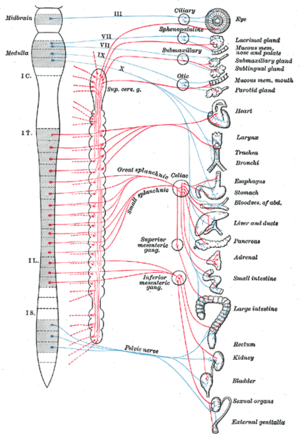Superior mesenteric ganglion
In the upper part of the superior mesenteric plexus close to the origin of the superior mesenteric artery is a ganglion, the superior mesenteric ganglion.
| Superior mesenteric ganglion | |
|---|---|
 Sympathetic (red) and parasympathetic (blue) nervous system | |
| Details | |
| To | superior mesenteric plexus |
| Identifiers | |
| Latin | ganglion mesentericum superius |
| TA | A14.3.03.030 |
| FMA | 77589 |
| Anatomical terms of neuroanatomy | |
The superior mesenteric ganglion is the synapsing point for one of the pre- and post-synaptic nerves of the sympathetic division of the autonomous nervous system. Specifically, contributions to the Superior Mesenteric Ganglion arise from the lesser splanchnic nerve, which arises from the sympathetic chain of T10-11. This nerve goes on to innervate the jejunum, ileum, ascending colon and the transverse colon. While the sympathetic input of the midgut is innervated by the sympathetic nerves of the thorax, parasympathetic innervation is done by the vagus nerve (cranial nerve X) which travels along the plexuses that arise from the anterior and posterior vagal trunks of the stomach.[1]
References
This article incorporates text in the public domain from page 987 of the 20th edition of Gray's Anatomy (1918)
- Nervous System and Sensory Organs
External links
- http://anatomy.uams.edu/anatomyhtml/intestines.html
- Nosek, Thomas M. "Section 6/6ch2/s6ch2_30". Essentials of Human Physiology. Archived from the original on 2016-03-24.